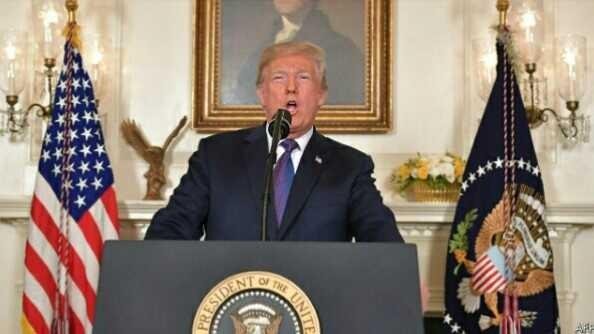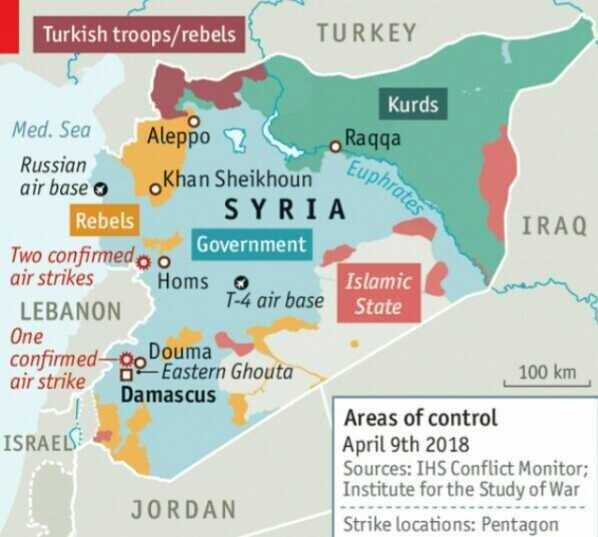America and its allies again try to deter Bashar al-Assad from using chemical weapons

AMERICA, Britain and France fired a barrage of missiles at targets inside Syria on April 14th. The early-morning strikes aimed to punish the regime of Bashar al-Assad for a suspected chemical-weapons attack that killed dozens of people in the city of Douma a week earlier. More than 100 cruise missiles, launched from warplanes and gunboats, struck three Syrian facilities: a scientific research centre used to produce chemical weapons near the capital of Damascus and two military bases further north.
American officials and their European allies were careful to characterise the attack as a one-off strike designed to deter Mr Assad from using chemical weapons again. America’s defence secretary, Jim Mattis, who urged caution in the lead-up to the attack, said: “We were not out to expand this; we were very precise and proportionate.” No more attacks are planned, said Mr Mattis, unless Mr Assad uses chemical weapons again. “This is not about intervening in a civil war. It is not about regime change,” said Theresa May, Britain’s prime minister.
Pentagon officials said the missiles first struck a scientific research centre near Damascus that develops, produces and tests chemical and biological weapons. The other two facilities targeted in the strikes are located west of the city of Homs (see map). One produces sarin gas and the other is part of a military command post, the officials said. Syrian state television claimed some of the missiles were shot down by the government’s air defence systems. Still, “a large part of [Syria’s] chemical arsenal has been destroyed," Jean-Yves Le Drian, France’s foreign minister, told French television.

The attack was twice as big as one launched by America last year, which failed to deter Mr Assad. The earlier strike, involving 59 cruise missiles, was in response to a chemical attack on the town of Khan Sheikhoun in Idlib province. The target, a Syrian air base, was back operating a day later and Mr Assad has launched several suspected chemical attacks since then.
Whether or not Mr Assad is deterred by the latest strike—and warnings of more to come if he continues gassing his people—it will do little to alter the the course of Syria’s civil war. Aided by Iran and Russia, Mr Assad has been winning for some time. Rebels control only a few pockets of territory and are largely cut off from international support. As the missiles hit their targets and anti-aircraft guns lit up the sky, hundreds of people took to the streets of Damascus to protest the strike. After the bombing stopped the Syrian presidency posted on Twitter a video of Mr Assad, dressed in suit and tie, confidently strolling into work. “The morning of resilience,” read the caption beneath.
When announcing the attack, President Donald Trump tried to shame Iran and Russia into stopping Mr Assad from using poison gas again. “To Iran and to Russia I ask: What kind of a nation wants to be associated with the mass murder of innocent men, women and children?” said Mr Trump. Russia, in turn, threatened to respond. “We warned that such actions will not be left without consequences,” said Anatoly Antonov, the ambassador to the United States, in a statement. But neither Russia nor Iran appears to have lost men or military kit in the strike. American and French officials say they warned Russia in advance.
Mr Trump’s desire to make good on his promise to punish the “crimes of a monster” appear to have stalled his plans to pull America out of Syria. About 2,000 American troops are based in the north-east of the country, where they fight alongside a Kurdish-led force against what is left of the Islamic State jihadist group. “We look forward to the day when we can bring our warriors home,” said Mr Trump, while announcing the attack. But his advisers want America to stay in Syria. For this administration, punishing Mr Assad is likely to prove easier than devising a coherent Syria policy.
Source: economist.com
#timesnews